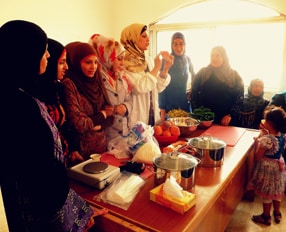
The October 15th, the International Day of Rural Women is celebrated around the world.
This Day was first celebrated in 2008, and was established by the General Assembly of the United Nations, recognizing “the role and contribution of rural women, including indigenous women, in enhancing agricultural and rural development, improving food security and eradicating rural poverty.”
Empowerment and training of rural women has always been a goal for the Foundation in identifying cooperation projects.
Rural women play a key role in rural economies in developing countries. Among other tasks, they participate in crop production and livestock care, and are responsible to provide a living for their families. Furthermore, all this is done in a muted form, with little visibility, and without suffering any decline the attention to their children and seniors in charge.
On this day we pay tribute to these women giving visibility to two Foundation projects developed in two different geographical areas:
The Agreement on the management of water resources in Jordan and the Palestinian Territories which subsidizes AECID and that the FPSC runs specifically in these countries and in collaboration with JOHUD and PARC respectively.
In order to strengthen the role of women as promoters of sustainable development in rural areas of Jordan and the Palestinian Territories, among other activities aimed at efficient water management, there are being conducted training courses on food security at household level in rural area localities.
The project that the FPSC develops in Carazo funded by the Junta de Castilla y León “Empowerment of rural poor women of the Department of Carazo, Nicaragua, through the implementation of a program of technical and vocational training oriented to enterprise and leadership”.
More than 200 low-income women participate in the FPSC project funded by the Junta de Castilla y León. All of them live in rural areas.
The program insists on issues such as school support, entrepreneurship and human development.
Here are some testimonials of women living in rural areas in Carazo and involved in this project:

